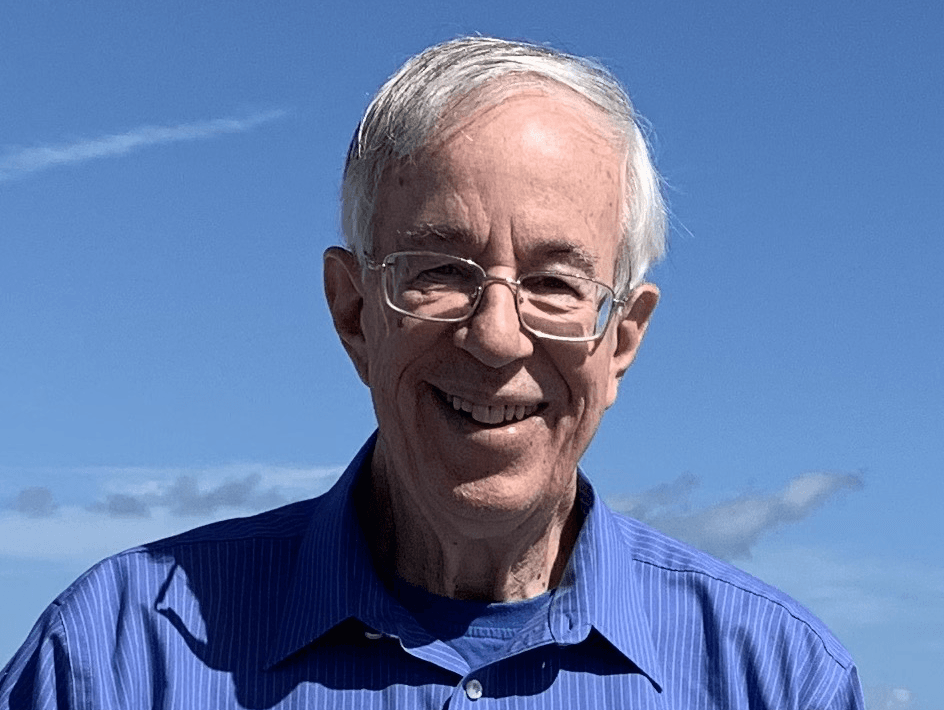The Cosmic Vision of Teilhard de Chardin
with
John Haught
*** HANDOUTS/READINGS & PROGRAM VIDEO RECORDINGS ARE NOW AVAILABLE ***
A LINK TO THE ON-DEMAND PROGRAM RECORDINGS & RESOURCES PAGE WILL BE EMAILED TO YOU WITH YOUR REGISTRATION CONFIRMATION RECEIPT.
CLICK HERE TO REGISTER & ACCESS THE PROGRAM RECORDINGS PAGE

The Cosmic Vision of Teilhard de Chardin
with John Haught
Over the past two centuries scientists have learned that the universe is a story still being told. The Jesuit geologist Pierre Teilhard de Chardin (1881-1955) sees this cosmic story as a great drama of awakening. When humans emerged, the cosmic awakening became palpably manifest by virtue of the arrival of thought, ethical aspiration, and religious faith. This series of four lectures brings out the contemporary significance of Teilhard’s vision of our still-awakening universe.
Over the past two centuries scientists have learned that the universe is a story still being told. The Jesuit geologist Pierre Teilhard de Chardin (1881-1955) sees this cosmic story as a great drama of awakening. When humans emerged, the cosmic awakening became palpably manifest by virtue of the arrival of thought, ethical aspiration, and religious faith. This series of four lectures brings out the contemporary significance of Teilhard’s vision of our still-awakening universe.
1. Teilhard’s Cosmic Vision and the Meaning of Faith
From the perspective of physics the cosmos may look like a process of heat exchanges and energy transformations, but if we look deep inside we shall see that the universe has given rise, at least on Earth, to beings eager to understand where they came from, where they are going, and what they should be doing with their lives. Furthermore, in the emergence of religious faith the whole cosmos is now awakening worshipfully to the reality of a rightness that abides forever.
2. Teilhard and Darwin
Darwinian science vastly extends the story of life and life's suffering (and creativity as well) beyond those of traditional theological awareness. In what sense, then, after Darwin, may believers still sustain faith in divine providence or uphold a firm sense of values, if at all? Is it perhaps possible that evolutionary portraits of life may open up fresh ways of thinking about God and the meaning of religious, and especially Christian, faith? After Darwin can we have a plausible understanding of God and faith that is consistent with traditional beliefs and core ethical aspirations while at the same time being in touch with scientific understandings of evolution?
3. Teilhard and Einstein: A Conversation
Although Albert Einstein denied the existence of a personal God, he considered himself to be deeply religious, and he thought that good science cannot take place without faith. To understand what he meant by religion and faith, this presentation will place the celebrated physicist in “conversation” with his contemporary, Pierre Teilhard de Chardin. The two scientists had been living in the United States within miles of each other when they died in 1955—within days of each other. If they had ever met and been able to talk about science and faith how would the conversation have gone? What would they have said to one another about prayer, God, and the relationship of theology to science? This talk, with the presenter as “moderator,” will attempt to outline points of agreement and disagreement between the two great scientists and religious thinkers.
4. Teilhard and the Meaning of Faith after “Dover Beach”
The British poet Matthew Arnold, in his poem “Dover Beach” (1867), lamented the withdrawal of the “sea of faith” and the death of nature during the age of modern science. So also did other literary giants (such as Thomas Hardy) in the century of “God’s Funeral” (the title of a book by Colin Wilson on nineteenth century literature). In this presentation we examine connections between modern science, the “death of nature,” the decline of faith, and the “death of God.” This will allow us to accentuate the importance of Teilhard for both the intellectual and spiritual life of the 21st century.
John F. Haught (Ph.D Catholic University, 1970) is Distinguished Research Professor, Georgetown University, Washington DC. He was formerly Professor in the Department of Theology at Georgetown University (1970-2005) and Chair (1990-95). His area of specialization is systematic theology, with a particular interest in issues pertaining to science, cosmology, evolution, ecology, and religion. He is the author of 22 books. His latest books, God After Einstein, The New Cosmic Story: Inside Our Awakening Universe, A John Haught Reader: Essential Writings on Science and Religion and Resting On the Future: Catholic Theology for an Unfinished Universe.
Haught has also authored numerous articles and reviews. He lectures internationally on many issues related to science and religion. In 2002 he was the winner of the Owen Garrigan Award in Science and Religion; and in 2004 the Sophia Award for Theological Excellence. He testified for the plaintiffs in the Harrisburg, PA “Intelligent Design trial” (Kitzmiller et al. vs. Dover Board of Education); in 2008 he received a “Friend of Darwin Award” from the National Center for Science Education. In Fall 2008 he held the D’Angelo Chair in the Humanities at St. John’s University in New York City. In April 2009, for his work in science and religion, he received an honorary doctorate from Louvain University, Belgium. He and his wife Evelyn now live in Vero Beach, Florida.
haughtj@georgetown.edu
Dates: 4 Wednesdays - Oct. 26, Nov. 2, 9, & 16, 2022
Time: 10:00 AM – 12:00 PM Pacific
Cost: $60.00 (Please do not let cost deter you from attending - Click Here to learn more about funding)
Location: Zoom on-line – a link will be sent to you a few days before the program begins.

